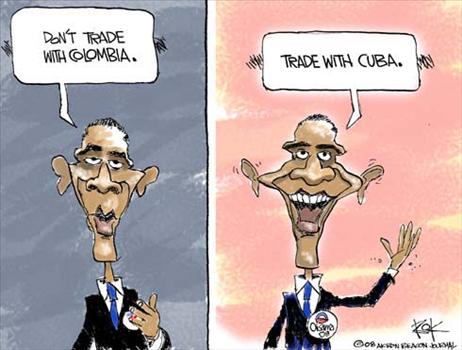The controversial Cuban 'blogger' Yoani Sánchez, darling of the western media and the White House, is currently enjoying the liberty to travel afforded by recent changes to the migration regulations in order to make a much publicised tour of Brazil.
So far it has all been a bit of a circus. In Brazil, pro-Cuban supporters have hounded the 'bloguera' and unsurprisingly the media spotlight has focused intently upon her. At one press conference (see film above), when she was asked if it was true that Wikileaks had revealed she was an agent of the CIA, she denied it saying: "I well remember the Wikileaks documents in which my name is mentioned and there is not one that says 'Yoani Sanchez is CIA.' That is totally false, it does not exist. It could not exist because I am not in the CIA."
She chose her words carefully. There is, after all, a distinction between being IN the CIA and working FOR the CIA or, for that matter, in the interests of the United States.
In fact her name crops up in many Wikileaks documents linking her to the US Interests Section in Havana. One for example, that Yoani did not mention, reveals that in 2011 she and her husband, Reynaldo Escobar, were guests at the home of Michael Parmly, then Head of the US Interests Section in Havana:
http://www.cablegatesearch.net/cable.php?id=07HAVANA622&q=parmly%20sanchez%20yoani
This report is interesting. For example it openly states:
"HUSBAND-AND-WIFE TEAM REINALDO ESCOBAR AND YOANI SANCHEZ VISITED THE U.S. CHIEF OF MISSION'S RESIDENCE TO SHARE THEIR IMPRESSIONS OF CUBA'S MEDIA ENVIRONMENT AND EXPOUND UPON THE UNIQUE POSITION THEREIN OF THEIR ON-LINE PUBLICATION, CONSENSO.
The US Interests section cable describes Consenso as "GROUNDBREAKING IN CUBA AND POSES A THREAT TO A CUBAN GOVERNMENT," and goes on to say this about Yoani and her partner:
"THE DUO IS UNIQUE AMONG CUBA'S INDEPENDENT JOURNALISTS IN THAT THEY VOLUNTARILY RETURNED TO CUBA TO HELP EFFECT CHANGE AFTER HAVING ESTABLISHED SUCCESSFUL CAREERS IN EUROPE. INDEED, CITING THE FACT THAT "THE BATTLE MUST TAKE PLACE IN CUBA," MS. SANCHEZ CLAIMS TO HAVE DISCARDED HER PASSPORT."
Evidently, Yoani still has her passport and the strategy of fighting the battle inside Cuba appears to have been abandoned. Shortly after her Brazil trip we can expect the 'I am not Yoani CIAnchez' to pop up in the United States, where she is due to make a tour of universities, apparently organised by a professional acquaintance of mine, Ted Henken, whose own blog, El Yuma, I notice is following her progress with a dedicated interest...
In all this Humbert Wolfe's rhyme about British journalists comes to mind:
You cannot hope
to bribe or twist,
thank God! the
British journalist.
But, seeing what
the man will do
unbribed, there's
no occasion to.
to bribe or twist,
thank God! the
British journalist.
But, seeing what
the man will do
unbribed, there's
no occasion to.





